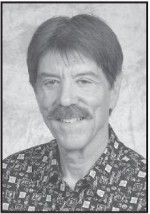Returning to his alma mater

Wayne Guida got more than just a job from USF. He is a product of the institute that employs him – one of only a handful of professors at USF. Not only does he teach class and maintain two research labs – one at Moffitt Cancer Center and one for USF’s chemistry department – he is also an accomplished USF graduate who contributes to the department that launched his career.
“To be able to come back and contribute and bring my area of expertise to the department,” Guida said. “It’s like a dream come true.”
Guida received his bachelor’s degree in chemistry from USF in 1968, as well as his doctorate in organic chemistry in 1976. He became interested in chemistry and computers while at USF, which led him to pursue work in computational chemistry, the use of computers to diagram and study microscopic molecules and compounds.
Guida continued his post-doctoral career at Duke University where he conducted research for the National Institute on Drug Abuse. His work included studying the metabolic pathways of cocaine in the body. This involved the use of pharmaceutical-grade cocaine, he said, which was locked in a safe at the university hospital. The presence of such potent narcotics require discreetness.
“If the wrong people found out, we didn’t want to get held up at gunpoint,” he said. “It was a fun project.”
After a year at Duke, Guida spent time as a professor at Eckerd College, a researcher at Columbia University, and President and CEO of Schrödinger, Inc., a company that produces software for research labs. Upon returning to Florida and accepting a position at Eckerd College for the second time, Guida became involved with the Moffitt Cancer Center as a researcher in the Drug Discovery Program.
While spending time at Moffitt, Guida was reintroduced to the unit that trained him – USF’s chemistry department. In Fall 2007, he began his tenure as a USF professor within the department.
Guida currently conducts research for both the Moffitt Cancer Center and USF. Using computer software, Guida analyzes microscopic components such as the proteins that make up modern drugs. By understanding how these molecules interact with the body, he provides vital information to pharmaceutical manufacturers. At Moffitt, his work in computational chemistry contributes to the development of drugs that may one day fight cancer.
At the same time, his lab at USF enables him to work with students on projects beyond the realm of cancer-fighting medicine, he said.
Guida, along with USF professor and chemist Brian Space, recently contributed to securing a $499,999 grant from the National Science Foundation.
“He is a leading researcher in (his field),” Space said of Guida. “He brings a lot of insight that the average computational scientist doesn’t have.”
The grant will pay for expensive equipment that can benefit several research groups in the chemistry department, they said.
Guida’s coworkers are not the only ones giving him high praise. In 2005, USF honored Guida with the Outstanding Alumnus Award.
“That was great. I was really, really delighted. I didn’t even know I was being considered,” he said. “When I found out, I was overwhelmed.”
Guida said he is excited to return to his educational home as a teacher and research mentor to students. Guida feels he is paying back the exceptional instruction he received while attending USF.
“I had really great professors,” he said. “Just too many to name.”
He also hopes to serve as a role model for the students with whom he works. In addition to his research, he teaches Introduction to Medicinal Chemistry to undergraduate and graduate students.






